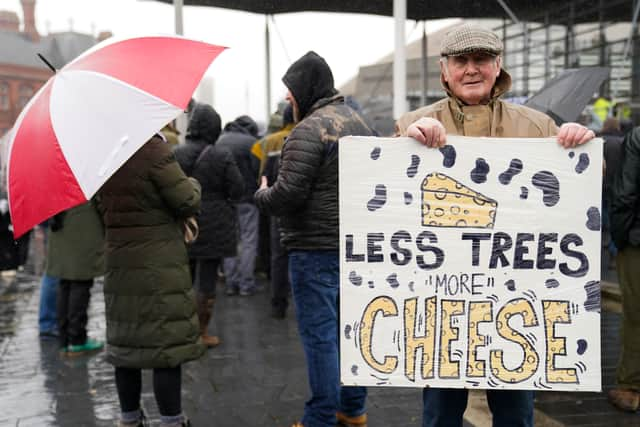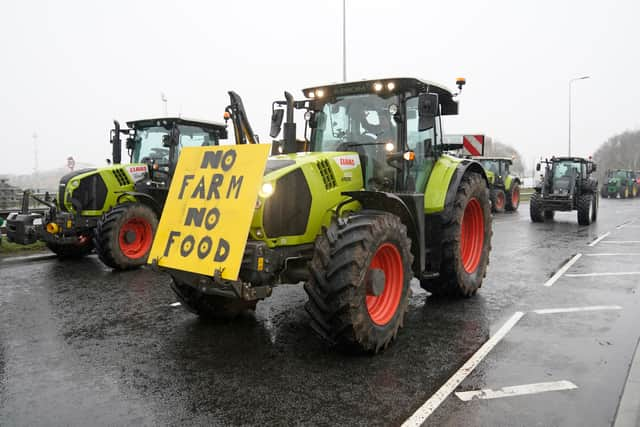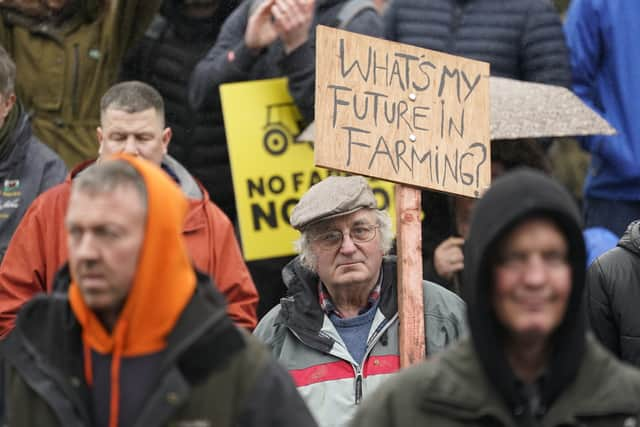Why are Welsh farmers protesting? Thousands descend on government over environmental funding scheme proposal
and live on Freeview channel 276
Thousands of Welsh farmers have descended on parliament armed with signs and tractors, to fight back against a proposed subsidy overhaul they fear may threaten their industry.
The Welsh government is currently holding a public consultation on its Sustainable Farming Scheme, which would require 10% of a farmer’s land to be covered in trees, in order for them to receive public funding in the future. But while farmers are concerned about the changes, which they say could potentially mean thousands of jobs lost in Wales' farming sector, the move is being celebrated by environmentalists - who say the proposal is both fair and flexible.
Advertisement
Hide AdAdvertisement
Hide AdIn what is thought to be one of Cymru's largest ever farming protests, some 3,000 farmers and agriculture industry workers from across the country gathered in Cardiff Bay on Wednesday (28 February). Many waved Welsh flags and held placards in Welsh and English reading: “No Farmers, No Food”, while a convoy of tractors were left parked just outside the city.
But what exactly are they protesting about, and what do the government and environmentalists say about the proposal - with just nine days left to have your say? Here's everything you need to know:


What is the Welsh government proposing?
The government says the Sustainable Farming Scheme is a proposal detailing how Welsh farmers will be rewarded for responding to the climate and nature emergencies - as well as producing food in a sustainable way.
The scheme would support farmers financially who go above the minimum environmental requirements set out by law. It lists a series of 'universal' actions, which every farmer wanting to benefit from the funding will be required to do, as well as other optional and collaborative actions. One of the scheme requirements will be that at least 10% of each farm should be actively managed as habitat which will benefit wildlife - as well as being used to produce food - which can include everything from ponds, to hedgerows, to in-field trees, to semi-natural grasslands.
Advertisement
Hide AdAdvertisement
Hide AdIt also proposes a minimum of 10% tree cover on each farm as a scheme requirement, to be met by 2030. Unplantable areas like roads will be excluded from the total land calculation. However, these two rules do not necessarily mean farmers who currently have very little to no tree cover or habitat will lose 20% of their farmland.
There is lots of flexibility - such as counting native woodlands towards both requirements. Many habitat types, such as traditional grasslands and heathlands, can be grazed by livestock while still counting towards your total. On top of that, farms without enough permanent habitats can earn the funding by creating temporary habitats to help wildlife - such as by planting a multi-species pasture.
In response to Wednesday's protest, a Welsh Government spokesperson said: “Farming is very important to Wales and our economy and we want a successful future for Welsh farming. We have had a seven-year conversation with farmers to design future farming support and we are committed to continuing to work with farmers to develop the Sustainable Farming Scheme."
This was a "genuine consultation", they continued, and no decisions would be made on the proposal, including how farmers achieve the habitat and trees requirement, until the consultation responses had been fully analysed. "We have been clear we expect changes to be made following the consultation, and we will continue to listen."


Why are farmers upset about this?
Advertisement
Hide AdAdvertisement
Hide AdFarming leaders claim that if the scheme went ahead as currently proposed, it could result in as many as 5,500 job losses in the sector. The Farmers' Union of Wales (FUW) has been in "emergency talks" with government, and said it had clearly expressed the deep concerns and resentment felt by its members.
"We have called for an independent assessment to take place on the socio-economic impact and bureaucratic burden of Welsh Government agricultural policies," President Ian Rickman said, which would include the sustainable farming scheme. "This time must also be used for a series of regular meetings involving the Minister for Rural Affairs and her officials with both farming unions to rethink the proposals through genuine co-design. This needs to include an independent panel tasked with looking at alternatives to tree planting so we can work towards net zero in a more sustainable way."
The FUW said the scheme must be accessible for all farming businesses, and provide long-term stability for the wider rural economy. “From what we can see, the [scheme] in its current form will not be sustainable and is clearly not ready, and the Minister repeated her assurances that it wouldn’t be launched until it is," he said.
Speaking from the protest, fifth-generation farmer Ioan Humphreys told PA: “I’ve got a two-year-old son sitting at home who loves every minute of being on the farm, and I am fighting for his future on that farm." He said farmers were the "heart and soul" of Wales' local communities, "and I for one am fed up of being treated like the villain".
Advertisement
Hide AdAdvertisement
Hide Ad“Where do the people thinking up these schemes think their food is going to come from when there’s farms ravaged by TB and we’re busy pruning trees?" he asked. Meanwhile, Sarah Morris, a sheep farmer from Bridgend, held up a sign outside the Senedd in Cardiff reading: “Mr Drakeford… my sheep can’t grow on trees”.
She told PA that the government was holding farmers to ransom, "because [it is] saying we won’t get subsidies if we don’t do all the steps". She continued: "These proposals will mean that I lose 14 acres of viable land, that I won’t be able to keep any more stock. Wales has got a tremendous farming history and we need to make sure that it continues."


What do environmentalists say?
Coed Cadw, the Woodland Trust in Wales, says that on average, tree cover on farms in Wales is already at 6–7%, so for many farms making this up to 10% was a "relatively modest requirement". The costs of new planting would also be covered by government grants, they said, while the habitat requirement was also flexible.
The trust believed that many farmers would be able to achieve the goals in ways that supported their business, as well as providing public benefits - which justified receiving public funding. "We support the policy to significantly increase tree cover on farms," Coed Cadw director, Natalie Buttriss, said. "We think that it is necessary and desirable, both for farming and the public. This is clearly a big change for farmers and we think it is appropriate to use public funding through the Sustainable Farming Scheme to support farmers in making this change."
Advertisement
Hide AdAdvertisement
Hide AdFarming was facing many financial and sustainability challenges, and farmers themselves were on the frontline of the climate and nature crisis, she continued. Trees on farms were vital for pollinators, livestock welfare, flood mitigation, and carbon capture and storage. Native trees could naturally filter pollution and help reduce soil erosion, while helping stop waterways becoming polluted.
"We need a multi-faceted approach to tackling these wider challenges. We firmly believe that the basic minimum tree cover and habitat requirements in this scheme will help farming, the environment and the population of Wales," Ms Buttriss added. "We know from working directly with farmers across Wales that many are finding successful ways of working with trees that are good for their farm business and the natural environment as well as the public, whilst complementing quality, sustainable food production. With flexibility and innovation this is all achievable."
The Wildlife Trusts Wales and WWF Cymru say that Welsh farmers are already feeling the impacts of climate change. But by adopting nature and climate-friendly farming measures, they can be part of the solution - while making their businesses much more resilient in the face of extreme weather events.
Wildlife Trusts Wales ambassador Iolo Williams said of the consultation: "It’s crucial that people make their voices heard and show their support for farmers who farm in a nature-friendly way. We know many farmers are restoring nature on their farms, protecting rivers from farm pollution and producing food more sustainably by decreasing the use of pesticides and fertilisers. This is the type of farming that so many of us want to see across Wales."
Advertisement
Hide AdAdvertisement
Hide AdBut the trusts said that in order to be truly effective, the proposed scheme must be properly funded and supported in the long-term - or farmers were quite right to be concerned about their future livelihoods. With 90% of Wales being farmland, managing it to store carbon and to hold back floodwaters would be needed for the country to mitigate the impacts of climate change.
The scheme as it stood could enable this, a spokesperson said, but the Welsh government must invest in the future of sustainable farming by making payments attractive to farmers.
Comment Guidelines
National World encourages reader discussion on our stories. User feedback, insights and back-and-forth exchanges add a rich layer of context to reporting. Please review our Community Guidelines before commenting.
